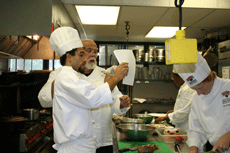Past the stainless steel countertops and the tall, white hats bouncing from task to task, Chef Randy Cheramie observes his students’ work. Above the humming of blenders and the clattering of pots, he answers the questions of his students, who are busy preparing breakfast. Last week Cheramie traveled to a Walt Disney World studio to supply his booming voice for Darnell, a frog hunter in an upcoming Disney feature animated film, “The Princess and the Frog.”
“How lucky is that?” Cheramie says.
Cheramie, interim dean of the Chef John Folse Culinary Institute, doubles as an actor, performing in at least one show a year, mostly in New Orleans.
His voice can be heard in commercials, industrial films and a few museum audios throughout the nation.
In January he will play the lead role of Tevye in “Fiddler on the Roof,” a role he’s played five times. Cheramie says he enjoys getting into character, even if it’s one he’s played multiple times.
“I once played a Russian diplomat for five years, about 100 performances,” he says. “For five years I talked with an accent. I would do class and leave phone messages in a Russian accent.”
Cheramie graduated from Nicholls in 1976 with a degree in theater and a concentration in acting. He says one of the best skills he learned during college was time management; he rehearsed at least four nights a week but still had to maintain good grades. His father did not want his acting to affect his schoolwork, Cheramie says.
“I had to maintain a certain average to be able to perform,” Cheramie says.
After graduating college, Cheramie says he was fortunate to be employed at the Alley Theatre in Houston, one of the most prestigious regional theaters in the country.
During his fourth year at the Alley Theatre, the company ran into financial trouble and was shut down, leaving Cheramie out of work for a year.
Cheramie had a short stint in radio before returning to his hometown of Golden Meadow in 1981, when his father was preparing to sell his eatery, Randolph’s Restaurant. Cheramie grew up in the business, mostly bussing tables on weekends and filling in for employees who didn’t show up for work.
“I couldn’t see the business going to someone else,” he says. “I realized I didn’t do well working for other people, so I made [my father] an offer.”
Cheramie says his grandmother was a great cook and showed him how to make stews and soups. He also learned from French cuisine textbooks and taught himself how to cook Creole dishes and make sauces, which saved the business, he says.
Cheramie was asked to teach a classical French cuisine course on campus in 2001. He says he had never thought about teaching, but grew to love it.
The University eventually asked him to teach a block of classes. Then, while he was closing the sale of his restaurant to one of his cooks, the University offered him a full-time position. Cheramie says he knew it was meant to be.
“If you would have told me ten years ago this is what I’d be doing, I would have said you were out of your mind,” Cheramie says with enthusiasm. “It’s a great job teaching young people who want to learn and do well so badly. How can you not get excited?”
Cheramie says many similarities exist between culinary and liberal arts, and he uses many theater metaphors in class. He says the “costumes” or uniforms of the staff, the lighting, the mood and the artistic presentation of the meal are all important.
“If the timing of the ‘cast’ isn’t up to par, it shows on the plate,” Cheramie says.








